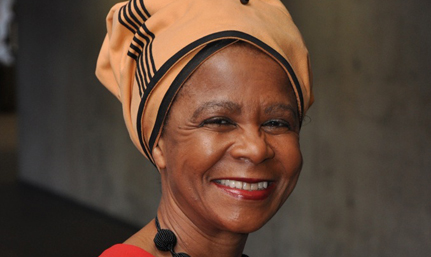Latest News Archive
Please select Category, Year, and then Month to display items
30 October 2018
|
Story Rulanzen Martin
|
Photo Peet van Aardt
 Some of the student writers who contributed to the anthology that tells their stories in Sesotho, isiXhosa, isiZulu, English and Afrikaans.
Some of the student writers who contributed to the anthology that tells their stories in Sesotho, isiXhosa, isiZulu, English and Afrikaans.
How do you transform the higher education curriculum? You involve the exact people the curriculum is intended for. The book, Initiative for Creative African Narratives (iCAN,) illustrates how decolonisation can be achieved through literature for students by students.
iCAN is an initiative by the Centre for Teaching and Learning (CTL) at the University of the Free State (UFS) to mentor students in creative and narrative writing. Under the mentorship of Dr Peet van Aardt, project coordinator, and Ace Moloi, author and UFS alumnus, iCAN Volume 1 was recently launched with 47 short stories written by UFS students.
“The project is a response from the centre for the ever-increasing need for decolonised curricula, steeped in the local cultural perspective of ubuntu,” said Dr Van Aardt.
“This book is an example for how decolonisation can be implemented,” said Prof Francois Stydrom, Senior Director of CTL. The overall aim of the iCAN project is to have the content that materialised from it to be included in the curriculum of first-year students at UFS in the near future.
Book provides multiple voices
Starting in May 2018, CTL presented a series of creative writing workshops on all three of the UFS campuses. “It’s a medium that allows a diverse range of students to express their views and develop their voices as writers,” said Prof Strydom.
It is a form of empowerment, to pass the baton to students to improve the UFS curriculum by writing and publishing their own stories, thereby contributing to larger bodies of knowledge through their lived experiences.
“I believe we as a university need to enable students so that they move away from just being users to becoming contributors to the curriculum,” Dr van Aardt concluded.
Inaugural lecture challenges leaders in higher education
2012-10-30
|

|
Dr Mamphela Ramphele
Photo: Stephen Collett
29 October 2012 |
Lecture (Pdf format)
According to international statistics, South Africa’s school performance is rated 140th out of 144 countries. South Africa is also ranked 143rd out of 144 countries when it comes to the quality of mathematics and science. About 600 000 South African graduates are unemployed and about 500 000 learners are failed by our current education system.
Dr Mamphela Ramphele brought these shocking statistics to the light at the inaugural lecture of the Annual Prestige Lecture at the Faculty of Education on Thursday 25 October 2012 at the University of the Free State (UFS).
This lecture will henceforth be known as the Mamphela Ramphele Prestige Lecture.
Dr Ramphelefocused her lecture on ‘Educating the 21st century citizen’.
“One of the defining characteristics of the 21st century is the vast number of choices that confront us every day at a personal, professional and political level.”
She asked if 21st century South Africans are equipped with the skills to make the choices that confront them daily.
“The failure to transform our apartheid education into one characterized by equity and excellence, is producing graduates who lack self-confidence.”
Dr Ramphele said that in South Africa about 1/6th of government expenditure goes to education, but the outcomes remain shocking.
For Dr Ramphele the answer lies in creating platforms for open conversation about South Africa’s painful past and the agenda for radical socio-economic restructuring should include the fundamental transformation of education.
She praised the UFS, under its current inspirational leadership, for its role as change agents through the education.
Prof. Rita Niemann, senior professor at the Faculty said the Annual Mamphela Ramphele lecture is to further expand and celebrate education in South Africa.
“Dr Ramphela has given us so much food for thought by challenging leaders in higher education to speak out about the questionable state of education in South Africa and to become engaged in the ‘revolution of the spirit’ in order to deliver citizens who own and shape the country.”